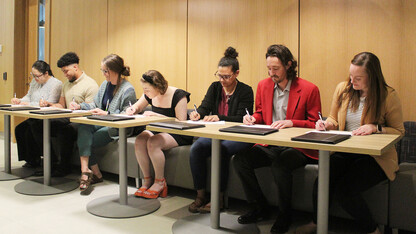· 4 min read
Nejati’s molecular research earns CAREER award

A University of Nebraska–Lincoln scientist is exploring new ways to build three-dimensional molecular structures that could have far-reaching impacts in electronics, medicine and more.
Siamak Nejati, assistant professor of chemical and biomolecular engineering, has received a five-year, $593,240 Faculty Early Career Development Program grant from the National Science Foundation to build on his previous research.
The technological advances made to control the synthesis and growth of molecular materials have been the cornerstone of many scientific discoveries. The goal of Nejati’s CAREER project is to realize a new green pathway that enables the high-precision deposition of ultra-thin porous and covalent organic frameworks. He will use a molecular layer deposition approach to construct films that feature a wide and tunable range of porosity in a solvent-free coating process.
Previously, scientists used a liquid-based process to synthesize these porous frameworks.
Nejati is honing a vapor-phase approach that can help form what are referred to as porous organic frameworks, or POFs, which are three-dimensional and much more versatile and easily assembled than their forerunners. The frameworks are composed of light elements such as carbon, nitrogen and oxygen. Scientists compare these materials and networks with LEGO bricks for their ability to be assembled in defined ways, forming a variety of topography and structures.
Nejati said the vapor-phase synthesis of POFs will enable integration of the films into energy-efficient, highly selective filters for gas and liquid separation schemes, along with electrodes for energy conversion and storage devices.
The proposed work will create a novel manufacturing process by allowing the synthesis of POFs that have not yet been processed as thin films. Moreover, the proposed research pathway allows for studying the physical and chemical properties of the frameworks, essential for developing fabrication processes with low environmental impact and energy footprints.
Nejati will leverage his materials-processing platform and separation science expertise to integrate organic frameworks as active layers in high-efficiency molecular separation technologies.
“In the past, we were mostly dealing with thin films of linear macromolecules,” he said. “Moving forward, we are trying to explore materials that can grow in more than one dimension. Now we can give them structures so we can explore different ways of arranging networks of materials. It is an easier-said-than-done task, and we are just at the beginning of it.
“Given the versatility, and the need for having these materials as thin films, this development can have a huge impact.
“In the next five years, a major milestone is to tune the porosity of these networks in situ,” Nejati said.
If scientists can achieve that, “it creates a lot of long-range possibilities” in electronics, opto-electronics, catalysis and more.
CAREER awards include an education and outreach component. Nejati plans to enhance participation of students from minority and underrepresented groups in STEM activities through a summer program to attract students to molecular engineering research. He plans to build on the existing infrastructure at Nebraska to conduct these outreach activities and enhance students’ experiences.
With the support of the Nebraska Center for Materials and Nanoscience, Nejati said he plans to develop a new interdisciplinary course centered on thin-film processing for semiconductor manufacturing. The resulting educational content, outreach activities and summer programs will be available to the public via Nebraska’s public digital library, Digital Commons.








